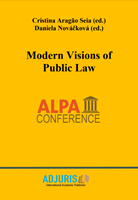Controversies Regarding the Withdrawal of the Right of Use over the Land Assigned on the Basis of Law No. 15/2003 Regarding the Support Given to Young People for the Construction of a Personal Property
Controversies Regarding the Withdrawal of the Right of Use over the Land Assigned on the Basis of Law No. 15/2003 Regarding the Support Given to Young People for the Construction of a Personal Property
Author(s): Raluca Laura Păunescu Dornean
Subject(s): Governance, Public Administration, Sociology of Law, Administrative Law
Published by: ADJURIS – International Academic Publisher
Keywords: right of use; administrative law; territorial administrative unit; urban planning certificates;
Summary/Abstract: The main objective of the pending study is to highlight the legal controversies in the situation of the withdrawal of the right of use over the land that was assigned to the beneficiary based on Law no. 15/2003 regarding the support given to young people for the construction of a personal property. Specifically, the author investigates the possibility of establishing the suspension of the one-year term within the mixed resolutive condition stipulated in both art. 6 para. 1 of Law no. 15/2003 which imposes on the beneficiary of the land the obligation to start the construction of the house within one year from the date of allotment of the land and to carry it out in compliance with the provisions of Law no. 50/1991 regarding the authorization of the execution of construction works, republished, with subsequent amendments and additions, as well as in the clauses of the award contract for free use. In the same sense, the fulfillment of the negative condition will be analyzed - as a modality of the civil legal act, namely the fact that the non-start of the construction within the one-year period may be due to the public authority, which, in bad faith, determined the non-realization of the event, by delaying the adoption of the decision of the local council regarding the Urban Planning Regulations, the blocking of the issuance of urban planning certificates/building authorizations and implicitly the impossibility of the beneficiaries to start construction in compliance with the legal provisions. The research methods to achieve the proposed objectives are varied, taking into account the comparative method, as interdisciplinary aspects between administrative law and civil law are exposed, the logical method, which tends to outline a more rigorous legislative exposition, the critical method, with the aim of presenting the limits of discretionary power, as well as the systemic method, which tends to the possibility of bringing scientific research a cardinal importance. The results and implications of the study will be major from the perspective of the application of the law and the interpretation of the legal provisions, taking into account the legal nature of the right to use a land assigned on the basis of the special law.
Book: Modern Visions of Public Law
- Page Range: 146-157
- Page Count: 12
- Publication Year: 2023
- Language: English
- Content File-PDF

